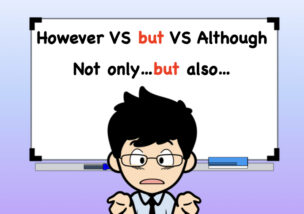
接続詞(正確には等位接続詞)butは以前の記事で紹介したFANBOYSのBにあたります。等位接続詞は単語と単語、句と句、節と節を繋ぐときに使われる接続詞の一種で、複文と重文(complex sentences)が作れます(つなぐ2文は並列構造を守ります)。また、not only…but (also)という表現も接続詞のbutを使っています。
接続詞butは、althoughやhoweverと置き換える事がありますが、いくつか注意点があります:
- butは文の冒頭には来ません。
- butの方がカジュアルな印象を与えます。
- 文章を書く際はカンマのある・なしも重要です。
さらに、ネイティブ・スピーカーからすると、A although BをB although Aに変えると、文の意味に違和感を感じる時があります(althoughは従属接続詞の為、AとBの依存性が入れ変わってしまいます)。butの場合、文の意味は変わってもその違和感がなくなります。説明だとイメージしづらいので、例文をこの記事で紹介します。
本日は、接続詞butとnot only butの意味と例文32選を、講師として18年以上の経験を持つネイティブ・スピーカーで異文化コミュニケーションの専門家(米・仏・日)である筆者が紹介します。
後半は、but、althoughとhoweverの違いとよく見かける間違いも紹介します!
1. 接続詞butの基本的な使い方
・カンマが必要な場合
・カンマが不要な場合
2. Not only…but (also)の使い方
・丁寧な言い回しで使うnot only…but also
・Not onlyが前に来て文を強調する
・not only…but alsoの間違った使い方
・「〜ではなく。。。(むしろ)」と言う意味のbutの使い方
3. howeverとbutの違い
4. althoughとbutの違い
無料体験レッスン実施中! 言語を学びたい・話せるようになりたい方は無料体験レッスンへ
1. 接続詞butの基本的な使い方
カンマが必要な場合
I want to lose weight, but I don’t like to exercise.
「体重を落としたいけど運動が嫌いです。」
I’m sorry, but this seat is taken.
「申し訳ございませんが、この席には誰か座っています。」
※謝った後によくbutを使います。
The kids want to play outside, but it’s raining.
「子供たちは外で遊びたいのですが、雨が降っています。」
カンマが不要な場合
※butの前と後の文の主語が一緒の場合。
The restaurant was great but a bit expensive.
「レストランは素晴らしかったですが、少し高かったです。」
It’s good but not that good.
「いいけどそこまで良く無いかな。」
It’s not good but not bad either.
「良くも悪くもないよ。」
2. Not only…but (also)の使い方
丁寧な言い回しで使うnot only…but also
My car is not only energy efficient but also comfortable.
「私の車はエネルギー効率が良いだけでなく、快適でもあります。」
Sleep depravation can cause not only exhaustion but also all kinds of diseases.
「睡眠不足は疲労感だけでなく、あらゆる病気の原因となります。」
She speaks not only Japanese but also French.
「彼女は日本語を話すだけでなく、フランス語も話します。」
Not onlyが前に来て文を強調する
Not only does my daughter play the piano, but she also plays the violin.
「娘はピアノだけでなく、バイオリンも弾きます。」
Not only do I consider him my friend but also my brother.
「私は彼を友人であるだけでなく、兄弟とも思っています。」
Not only will they renovate the inside but also the outside.
「内部だけでなく外部もリニューアルします。」
not only…but alsoの間違った使い方
その①
間違った文:
The experience not only changed his life, but also the lives of others.❌
解説:
この文は、changedの位置が間違っています。なんとなく文の意味は通じますが、本動詞のchangedはhis lifeとthe lives of othersの両方にかかっていますので、not onlyの前に来ます。ここでも、並列構造は守られていません。
正しい文:
The experience changed not only his life, but also the lives of others.⭕️
The experience not only changed his life, but also changed the lives of others.⭕️
その②
間違った文:
The lessons has not only helped him improve his accuracy but also to gain confidence.❌
解説:
一見問題なく見えますが、helpedはnot only の前に来るべきです。また、not onlyとbut alsoの後に来る文の形が異なっています(並列構造を守っていません)。…not only to help…but also to gain…でしたらまだいいのですが、toが無駄に文章を複雑にしています(helpの後のtoは元から不要です)。
正しい文:
The lessons has helped him not only improve his accuracy but also gain confidence.⭕️
その③
間違った文:
I think of him both as a friend but also as a rival.❌
解説:
ここでは、both…and…とnot only…but also…が混ざってしまっています。どちらかにしましょう。
正しい文:
I think of him not only as a friend but also as a rival.⭕️
I think of him both as a friend and as a rival.⭕️
「〜ではなく。。。(むしろ)」と言う意味のbutの使い方
This is not the best solution to our problem but a temporary fix that will do for now.
「これは問題に対する最善の解決策ではありませんが、現時点では十分な一時的な修正です。」
The problem is not his ability to learn but (rather) his lack of professionalism .
「問題は彼の学習能力ではなく、(むしろ)彼のプロ意識の欠如です。」
3. howeverとbutの違い
解説:butをそのままhoweverで置き換える事ができません。
注:howeverの前は「.」または「;」を使います。
The service was attentive but a bit slow.⭕️
「サービスは丁寧でしたが、少し遅かったです。」
The service was attentive however a bit slow.❌
→ The service was attentive. However, it was a bit slow.⭕️
「サービスは丁寧でした。ただし、少し遅かったです。」
The service was attentive, however a bit slow.❌
→ The service was attentive; however, it was a bit slow.⭕️
「サービスは丁寧でした。ただし、少し遅かったです。」
4. althoughとbutの違い
注:butをそのままalthoughと入れ替えると、文の意味が変わってしまう事がありますので、
2文の順序に気をつけましょう!また、althoughと違って、butは文の頭に来ません。
例①
It was raining, but we went outside.⭕️
「雨が降っていました、でも私たちは外に出ました。」
We went outside, but it was raining.⭕️
「私たちは外に出ました、でも雨が降っていました。」
We went outside, although it was raining.⭕️
Although it was raining, we went outside.⭕️
But it was raining, we went outside.❌
「雨が降っていたにも関わらず、私たちは外に出ました。」
※「それでも外に出ました」と言う意味になります。
It was raining, although we went outside.❌
注:「外に出たにも関わらず、雨が降っていました。」という意味になってしまいます。
例②
It rained every day, but we were able to enjoy our vacation.⭕️
「毎日雨が降りましたが、楽しい休暇を過ごすことができました。」
It rained every day, although we were able to enjoy our vacation.❌
「休日を楽しめたにもかかわらず、」
→ Although it rained every day, we were able to enjoy our vacation.⭕️
→ We were able to enjoy our vacation, although it rained every day.⭕️
「毎日雨は降っていましたが、それでも休暇を楽しめました。」
例③
His article was published, but he wasn’t properly credited as the author.⭕️
「彼の記事は掲載されましたが、著者として名前が記載されていませんでした。」
→ Although his article was published, he wasn’t properly credited as the author.⭕️
→ He wasn’t properly credited as the author, although his article was published.⭕️
「彼の記事は掲載されましたが、著者として名前が記載されていませんでした。」
His article was published, although he wasn’t properly credited as the author.🔺
「著者として名前が記載されていなかったにも関わらず、記事は出版されました。」
※文としては間違いではありませんが、意味が全く異なります。
The Takeaway(要点):
接続詞butはカジュアルな喋り方やメールをする時によく使います。したがって、使いやすい等位接続詞になります。ただし、英語のライティング・テスト、ビジネスのスピーチやプレゼンなどでは、howeverやalthoughを使った方がよりフォーマルな印象を与えます。この時、文の順序に気をつけましょう!
また、butの使い方が理解できれば、not only…but alsoの使い方も明確になったと思います。一番間違えやすいのは文の本動詞の位置です。そして、並列構造を守りましょう!
前置詞と副詞のbutも存在ますので、butという単語は便利ですが、使いすぎない様にしましょう!
Thank you for reading until the end! Not only did you learn how to use “BUT” correctly, but you also learned its difference with “although” and “however”!

